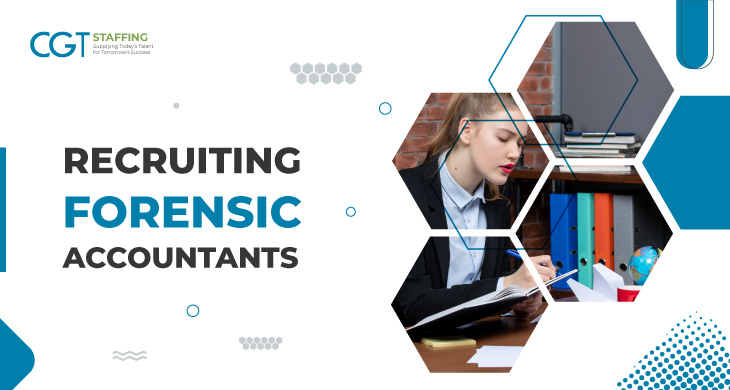In the ever-evolving landscape of finance and business, forensic accountants play a crucial role in detecting financial fraud, conducting investigations, and providing litigation support. However, organizations frequently encounter several challenges when it comes to recruiting skilled forensic accountants. In this blog post, we will explore the difficulties faced by staffing agencies and shed light on the reasons behind them.
Table of Contents
Growing Demand for Forensic Accountants
Forensic accounting has gained significant prominence in recent years due to the increase in corporate fraud and financial misconduct. This growing demand has put many organizations under immense pressure to attract qualified professionals who possess a unique blend of accounting, auditing, and investigative skills.
Lack of Specialized Talent
Traditional talent acquisition and recruitment strategies often fall short when the requisite skill set is not readily available in the marketplace. Forensic accounting is a niche field that requires individuals with a highly specialized skill set. However, finding candidates with the right combination of financial expertise, investigative acumen, and legal knowledge can be a daunting task.
Competitive Job Market
The demand for forensic accountants has outpaced the supply of qualified professionals in the market, leading to an intensely competitive job market. Skilled forensic accountants often command multiple job offers and higher salaries due to their specialized expertise. As a result, potential employers must navigate this competitive landscape and present attractive offers to viable candidates.
Evolving Skill Requirements
Forensic accounting is a rapidly evolving field due to advancements in technology and changes in financial regulations. Organizations must stay abreast of the latest trends and adapt to the evolving skill requirements in order to identify candidates who possess the necessary knowledge and experience. This requires continuous learning and proactive networking within the forensic accounting community.
Many organizations require forensic accountants to hold specific certifications, such as the Certified Fraud Examiner (CFE) or the Certified in Financial Forensics (CFF) designation. Companies must further navigate the challenge of identifying candidates who meet these credential requirements while also possessing the necessary experience and skill set.
Confidentiality and Security Concerns
Forensic accountants deal with sensitive financial information and are often involved in high-stakes investigations. As a result, companies face the challenge of finding candidates who can maintain strict confidentiality and adhere to ethical guidelines, and further, of conducting thorough background checks on identified prospects. This process involves formal verification of education, certifications, professional experience, and ethical standards. Centralized recruitment and screening can help in maintaining confidentiality; however, effective screening can be time-consuming and resource-intensive, adding to the challenges faced by organizations of every size. Partnership with a staffing agency often provides an immediate resolution to such concerns.
Building Trust and Relationships
Forensic accounting involves working closely with legal teams, law enforcement agencies, and other professionals involved in investigations. Organizations must establish trust and build strong relationships with both clients and candidates in order to effectively recruit forensic accountants. Personalized interactions, transparent communication, and a thorough understanding of client requirements are vital in gaining the trust of all parties.
Cultural Fit and Soft Skills
While technical expertise is crucial, forensic accountants must also possess excellent communication skills, critical thinking abilities, and the ability to work well within multidisciplinary teams. A lack of cultural fit can lead to insubordination, and an insubordinate employee can end up disrupting the whole workplace environment. Many companies face the challenge of identifying candidates who not only possess the requisite technical skills but also demonstrate strong cultural fit and soft skills necessary for effective collaboration and client interaction.
Industry Knowledge and Experience
In addition to possessing strong accounting and investigative skills, forensic accountants must also have industry-specific knowledge and experience. They need to understand the intricacies of different sectors, such as banking, healthcare, or insurance, to effectively identify financial irregularities and provide accurate analysis. It is frequently a challenge to find candidates with the right combination of industry expertise and forensic accounting proficiency.
Retention of Talent
Once forensic accountants are hired, retaining them becomes another challenge. Many forensic accountants are often attracted to the idea of working in law enforcement agencies or pursuing independent consulting roles, which offer more flexibility and autonomy. Organizations must develop strategies to retain their talent, to include professional development opportunities, challenging assignments, and a supportive work environment.
Conclusion
Recruiting skilled forensic accountants presents numerous challenges for would-be employers. The specialized nature of the field, the competitive job market, evolving skill requirements, confidentiality concerns, and the need for industry knowledge make it a complex task. However, by staying updated with industry trends, fostering relationships, and adapting to changing demands, companies can overcome these challenges and successfully meet the growing demand for forensic accounting professionals.
If your organization is in need of a forensic accountant, turn to CGT Staffing for your personnel needs.
